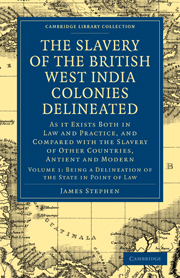 The Slavery of the British West India Colonies Delineated
The Slavery of the British West India Colonies Delineated Book contents
- Frontmatter
- PREFACE
- Contents
- PRELIMINARY CHAPTER: Of the Necessity and Importance of describing the State in question, and the general Plan of the Work
- BOOK I OF THE SLAVERY OF OUR COLONIES CONSIDERED AS A LEGAL INSTITUTION
- CHAPTER I Of the Origin and Authority of the Colonial Slave Laws in general
- CHAPTER II Of the Persons who are subject to Slavery in our Colonies
- CHAPTER III Of the legal Nature and Incidents of this Condition, as they respect and constitute the Relation between the Slave and his Master
- CHAPTER IV Of the legal Nature and Incidents of Colonial Slavery, as they respect its Relations to Persons of Free Condition in general, the Master and his Delegates excepted
- CHAPTER V Of the legal Nature and Incidents of West India Slavery, in its Relations to the Police and Civil Government of the Country
- CHAPTER VI Of this State of Slavery in respect of its Commencement and Dissolution
- Appendix, No. 1
- Appendix, No. II
- Appendix, No. III
- Appendix, No. IV
- Appendix, No. V
CHAPTER II - Of the Persons who are subject to Slavery in our Colonies
Published online by Cambridge University Press: 07 October 2011
- Frontmatter
- PREFACE
- Contents
- PRELIMINARY CHAPTER: Of the Necessity and Importance of describing the State in question, and the general Plan of the Work
- BOOK I OF THE SLAVERY OF OUR COLONIES CONSIDERED AS A LEGAL INSTITUTION
- CHAPTER I Of the Origin and Authority of the Colonial Slave Laws in general
- CHAPTER II Of the Persons who are subject to Slavery in our Colonies
- CHAPTER III Of the legal Nature and Incidents of this Condition, as they respect and constitute the Relation between the Slave and his Master
- CHAPTER IV Of the legal Nature and Incidents of Colonial Slavery, as they respect its Relations to Persons of Free Condition in general, the Master and his Delegates excepted
- CHAPTER V Of the legal Nature and Incidents of West India Slavery, in its Relations to the Police and Civil Government of the Country
- CHAPTER VI Of this State of Slavery in respect of its Commencement and Dissolution
- Appendix, No. 1
- Appendix, No. II
- Appendix, No. III
- Appendix, No. IV
- Appendix, No. V
Summary
Slavery in the West Indies is peculiar to negroes, or the mixed issue of negroes and Europeans within such a degree of propinquity to the sable stock, as distinguishes them, in some degree, in their features and complexions, from the European race.
In Jamaica, the condition ceases, by express law, to attach upon the issue at the fourth degree of distance from a negro ancestor. In other islands, the written law is silent on this head; but by established custom, the quadroons, or mestizes, so they call the second and third degrees, are rarely seen in a state of slavery; and never employed in any but domestic offices.—Even mulattoes are very seldom destined to the labours of the field.—Of the agricultural slaves therefore, who will, in a practical view, be the chief subjects of this enquiry, it might be said with tolerable correctness that they are exclusively negroes.
The masters, on the other hand, are chiefly of the European race and complexion; and though there are free persons, and even owners of Slaves, of African lineage, they labour under legal disabilities which constitute them an inferior order in society, and are regarded by their white fellow-subjects with great contempt: an extreme corporeal difference, therefore, marks in general the distinction between freedom and slavery; and the exterior appearance of the slave is, from its ordinary association with his degraded state, a badge of infamy or vileness.
- Type
- Chapter
- Information
- The Slavery of the British West India Colonies DelineatedAs it Exists Both in Law and Practice, and Compared with the Slavery of Other Countries, Antient and Modern, pp. 27 - 32Publisher: Cambridge University PressPrint publication year: 2010First published in: 1824


